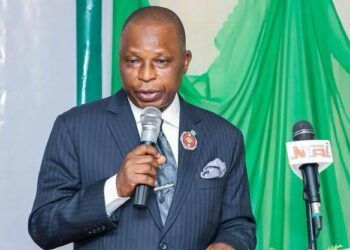The Federal Government has defended President Bola Tinubu’s declaration of a state of emergency in Rivers State, describing it as a necessary step to prevent a complete breakdown of governance, law, order and a threat to national stability; this is as it said it would be releasing the withheld monthly federal allocations of the state to the newly sworn-in sole administrator.
Attorney-General of the Federation and Minister of Justice, Lateef Fagbemi, while speaking at a special edition of Meet the Press at the Presidential Villa in Abuja yesterday, stated that the President had exhausted all diplomatic means before taking the drastic step.
“I think the President has acted timeously. He has given opportunity to all the parties involved to make amends. Before then, he had assembled them, he had tried to mediate,” Fagbemi said.
In a national broadcast on Tuesday, President Tinubu invoked Section 305 of the 1999 Constitution to declare a state of emergency in Rivers, suspending Governor Siminalayi Fubara, his deputy, Ngozi Odu, and all elected members of the Rivers State House of Assembly for an initial period of six months.
The President cited prolonged political instability, constitutional breaches, and security threats as justification for the emergency measure. He also appointed Vice Admiral Ibok-Ete Ibas (rtd), a former Chief of Naval Staff, as the state’s sole administrator. Fagbemi reiterated that the crisis in Rivers State had been ongoing for months, with several attempts at mediation failing.
“The events in Rivers State started a long time ago, and many times he [the President] tried to intervene. Apart from that, wellmeaning Nigerians, leaders of thought, and concerned citizens have also attempted to settle the matter without any result,” the Attorney General said.
He added that the political turmoil in Rivers was putting Nigeria’s economic lifeline at risk. “The situation cannot be allowed to continue, a situation in which the critical economic life of the nation, which is giving a lifeline to the nation, is being criminally touched without any response from those who would ordinarily be expected to act,” he stated.
The crisis escalated following a Supreme Court ruling on February 20, 2025, which Fagbemi said played a key role in the President’s decision. The court had ruled that Governor Fubara had repeatedly violated constitutional provisions and acted in a manner akin to a despot, concluding that governance had collapsed in the state.
“These are very serious and very weighty allegations that only an irresponsible Head of State or leader will fold his arms and ignore,” Fagbemi stated.
He added that the Rivers House of Assembly had been crippled since the end of 2023, after the governor demolished its building and relocated a faction of lawmakers to the Government House. “The government stands on a tripod: the executive, the legislature, and the judiciary.
You have made the functioning of the government impossible,” he said. Fagbemi further argued that the judiciary had done its job, and it was now the duty of the government to ensure the Supreme Court’s ruling was respected.
“By virtue of certain provisions of the constitution, everybody has a duty to ensure that judgments of the court are obeyed, particularly coming from the highest court in the land,” he said.
The Attorney General also linked the emergency rule to security threats, accusing the suspended governor of emboldening militants and failing to act when pipelines were being vandalised. “When he [Fubara] beckoned to them that he would let them know when it was time to act, did he come out to disown them?
The answer is no. A week after, they swung into action, vandalizing oil pipelines,” he stated. Fagbemi stressed that Nigeria still relied heavily on oil revenue, and any disruption in Rivers posed a direct threat to national stability. “For anyone to touch these pipelines, he is not only the enemy of Rivers but the enemy of Nigeria,” he said.















